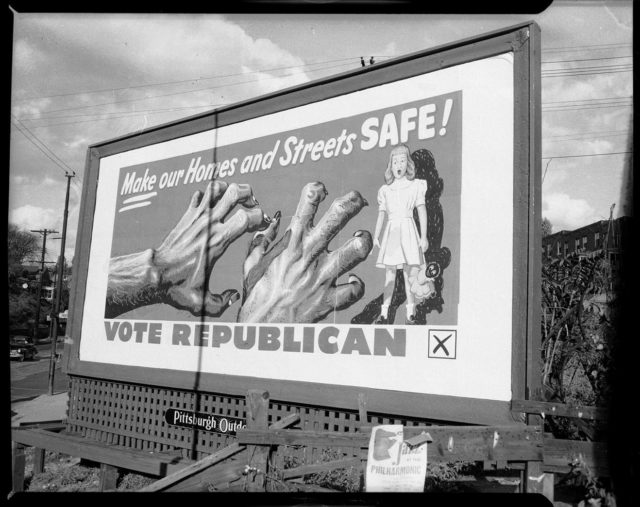Opinion
Teenie Harris Shot Donald Trump’s Roots as a Fearmonger
THE DAILY PIC: In 1949, Harris documented a Republican billboard that traded in racial anxiety.

THE DAILY PIC: In 1949, Harris documented a Republican billboard that traded in racial anxiety.

Blake Gopnik

THE DAILY PIC (#1605): Fearmongering has always been a political staple, but this photograph, from October of 1949, sure brings home Trumpism’s long pedigree. It was taken by a wonderful Pittsburgh photographer named Charles “Teenie” Harris, and will be in a show of his election shots that opens Aug. 13 at the Carnegie Museum of Art in Harris’s home town.
The billboard that Harris photographed was the Republican party’s contribution to “informed debate” in Pittsburgh’s mayoral election in 1949 – a postwar moment in American history not exactly known for its crime wave. In fact, there was a massive drop in homicides right around then, just as there has been over the first two decades of our new century. (“Sex crimes” did register a bump in Pittsburgh stats, but only because the police department was mounting a pogrom against gay citizens, whom local judges described as “society’s greatest menace.”)
In designing his image, it feels as though the billboard’s “artist” is counting on an audience primed to accept racial slurs because of the hideous anti-Japanese propaganda of World War II. The clutching fingers of his bestial predator have the long nails that Americans imagined on their Asian enemies, even though, in Pittsburgh in 1949, this image was probably meant to conjure up an African American “buck,” to borrow a slur from Ronald Reagan. But instead of blackness being the main subject of the billboard – after all, some Pittsburgh blacks still voted for the Party of Lincoln in 1949 – race gets in by the back door, in the golliwog doll the imperiled little princess is clutching. Talk about dog whistles.
I’m glad to say that there was pushback against this billboard, even among Republicans – more GOP resistance than Donald Trump sometimes faces today. The Republican owners of the Pittsburgh Outdoor Advertising Co. actually refused to honor their contract to put up 100 copies of the image once they saw it. They had to be forced to do so by a reluctant local judge, who called the picture “a shocking example of bad taste.”
The Republican party claimed that opposition to the image had been ginned up by their political adversaries, but in fact the local newspaper couldn’t find a single example of a Democratic operative who had mentioned the matter. Within a week of the billboard’s appearance, however, the Republicans themselves decided to replace it with a less offensive image.
Back then, at least, a Republican candidate could realize he’d crossed a line and decide to step back from it. (Carnegie Museum of Art, Heinz Family Fund)